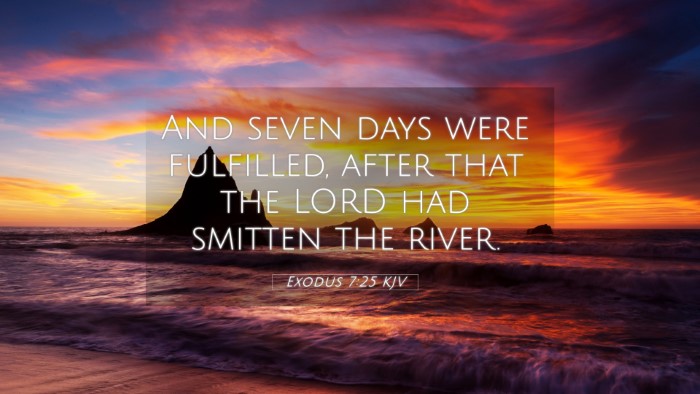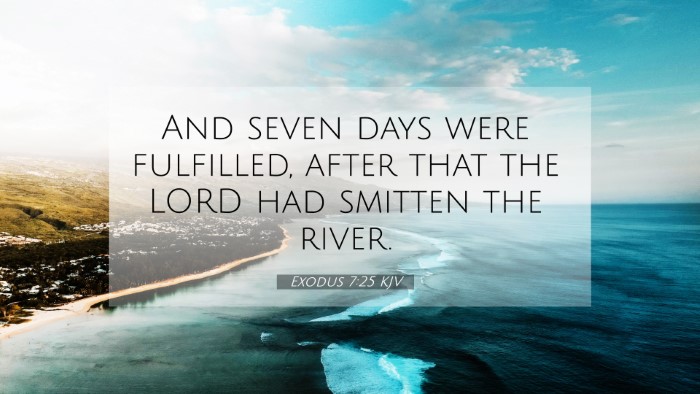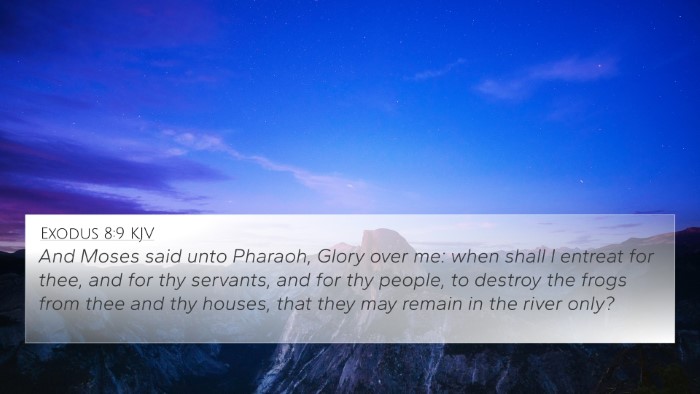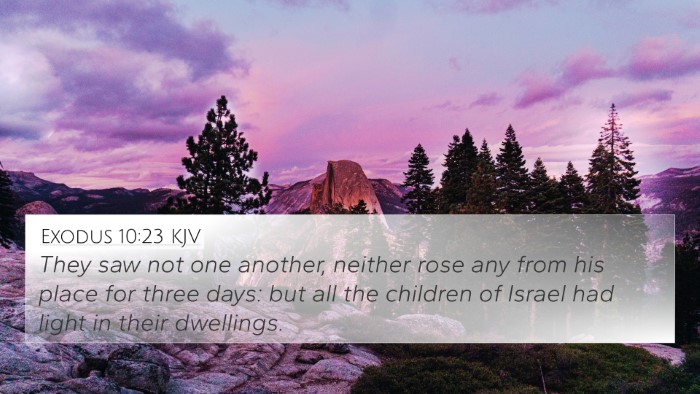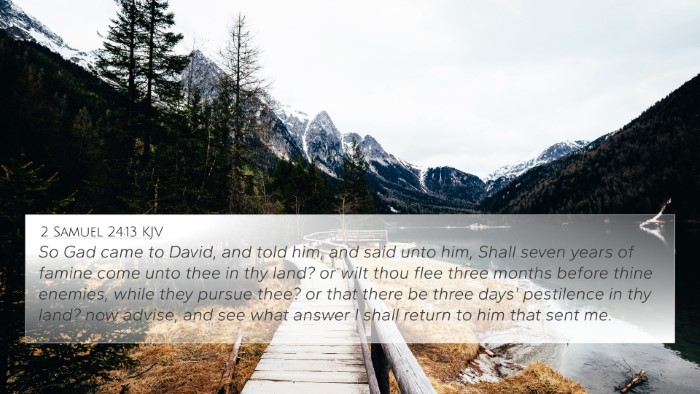Understanding Exodus 7:25
Introduction
Exodus 7:25 states, "And seven days were fulfilled, after that the Lord had smitten the river." This verse marks a significant moment in the narrative of the plagues of Egypt, serving as both a historical account and a theological reflection on God's power and His purpose in delivering Israel from bondage.
Meaning and Context
This verse occurs within the larger context of the plagues that God inflicted upon Egypt, specifically following the first plague where God turned the waters of the Nile into blood. The fulfillment of these seven days after the river was smitten arranges the timeline of Moses' interactions with Pharaoh and emphasizes God’s sovereignty.
Commentary Insights
- Matthew Henry: Henry notes the significance of this seven-day period as a divine preparation for the subsequent plagues, highlighting that God's patience should lead to repentance. This period serves as a reminder of God's authority over nature and the judgment that follows disobedience.
- Albert Barnes: Barnes reflects on the timing and God’s deliberate act of warning the Egyptians through Moses. He indicates that the seven days can symbolize the complete cycle of judgment and readiness for the coming deliverance.
- Adam Clarke: Clarke emphasizes the importance of this event in the framework of God demonstrating His supremacy over the Egyptian gods, specifically the Nile, which was sacred to the Egyptians. He also draws attention to the necessity of recognizing God's efforts to soften Pharaoh's heart through these judgments.
Cross-References
Exodus 7:25 can be cross-referenced with the following verses, highlighting thematic and narrative connections within the Scriptures:
- Exodus 7:19: Discusses the initial transformation of the Nile, setting the stage for the consequences of rebellion against God.
- Exodus 8:1-2: The command to Pharaoh to let the Israelites go, which follows directly after this judgment period.
- Exodus 14:4: God’s intentions to demonstrate His power not only through the plagues but also through the crossing of the Red Sea.
- Psalms 105:29: A reflection on the turning of water into blood, remembering God's wonders in Egypt.
- Romans 9:17: Referencing God's sovereignty, as He raised Pharaoh's heart to show His power.
- Revelation 16:4-7: A parallel in the final judgments where water is again struck in God's wrath.
- Isaiah 19:5: A prophecy concerning the Nile and its future, connecting the historical context of Exodus to prophetic literature.
Thematic Connections and Interpretations
This verse invites a variety of thematic explorations that are crucial for understanding God's nature and His actions:
- God's Justice: The plagues serve as a divine judgment on Egypt's oppression of Israel and their idolatrous practices.
- God's Mercy: The lengthy warnings and the waiting period exhibit His gracious character, offering time for repentance.
- Deliverance Through Judgment: The metaphor of God's judgment leading to Israel's liberation can be seen across both the Old and New Testaments.
- Faithfulness in Hardship: Exodus 7:25 reinforces the theme of trusting God's timing even when circumstances appear dire.
Bible Study Tools and Methods
Utilizing various Bible study tools can enhance the understanding of verses like Exodus 7:25. Here's how to engage with the text through cross-referencing:
- Bible Concordance: A useful tool for locating other verses related by topic or phrase.
- Bible Cross-Reference Guide: Helps to identify thematic connections between different scripture passages.
- Cross-Reference Bible Study: Techniques to explore the interrelatedness of scripture, enriching the understanding of the thematic messages.
Conclusion
In conclusion, Exodus 7:25 serves not only as a historical recount but also as a profound theological lesson on the character of God. The insights derived from various commentaries emphasize God's sovereignty, mercy, and the importance of recognizing His divine actions in the world. Through cross-referencing and thematic studies, believers can deepen their understanding of how this verse interconnects with the broader narrative of redemption found throughout the Bible.

